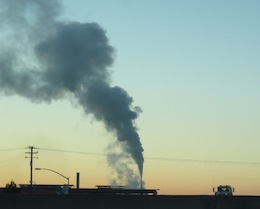Letter implores Brown to “re-evaluate” regulation

There’s a new sheriff in town, and environmentalists hope they can use that to their advantage. This week, the state chapter of the Sierra Club urged Governor Jerry Brown to reshape portions of the cap-and-trade rule, part of California’s Global Warming Solutions Act, widely known as AB 32.
In particular, the group is calling for tougher restrictions on polluters and stricter standards on carbon offsets.
“We’re asking him to put his own stamp on global warming reduction policy,” said Bill Magavern, director of Sierra Club California. He said the current cap-and-trade rule is too soft on oil companies and other big polluters and does not achieve greenhouse gas reductions in the best way possible. The law is currently in legal limbo, due to an unrelated legal challenge by environmental justice groups.
The Sierra Club California’s issues are by no means new. They are one of many that have been critical of carbon offsets–which would allow a polluter to invest in a carbon reduction project elsewhere, instead of reducing its own emissions. They made their concerns well known, but the Board voted against their recommendations.
“Well we continue to bring it up because we want to get the policy right for California,” Magavern continued, saying “there is no reason why the Brown Administration should just accept the Schwarzenegger cap-and-trade rule without any inquiry.”
In his letter, sent to the Governor on Monday and made public today, Magavern takes particular aim at forestry offsets, which he wrote, “could become an incentive for the conversion of native forests to tree plantations.”
Magavern praised Brown’s decades-old environmental record and enforcement of greenhouse gas laws as Attorney General, asking him to “scrutinize” some “serious flaws” in AB 32. In particular, he notes, “Research shows that out-of-state offsets will increase criteria pollution. Air pollution is worst in low-income communities and communities of color, such as the neighborhoods downwind from oil refineries.”
Mindy Lubber, President of Ceres, a non-profit that promotes sustainable business, agreed with the need for an effective carbon pricing mechanism, “because pollution has a price and it’s quite costly.” She continued,”We know that should be done as equitably as possible, and we want to make sure that people in low-income areas who are impacted by carbon pollution are able to be treated fairly.”
Another of Sierra Club’s issues is the giveaway of emissions allowances, or pollution permits. The Board’s economic advisors recommended auctioning these permits and using the revenue for the public benefit. Jill Watz, a venture partner with the private investment firm Vulcan Capital, agrees that emissions allowances should be auctioned, “Because nothing is free. And if they are free, it immediately creates distortion in the market.”
Other mandatory carbon markets in Europe and in the northeastern U.S. have struggled with these issues. Watz concedes, however, that some permits should be free to reward companies that have already made an effort to reduce carbon pollution.
Magavern said he’s glad to have a governor with a strong position on global warming. “We thought it was a good time to ask the governor to take a fresh look at some of these issues,” he explained. While he said he received a “brief, cordial response” from inside the administration, he declined to elaborate.
